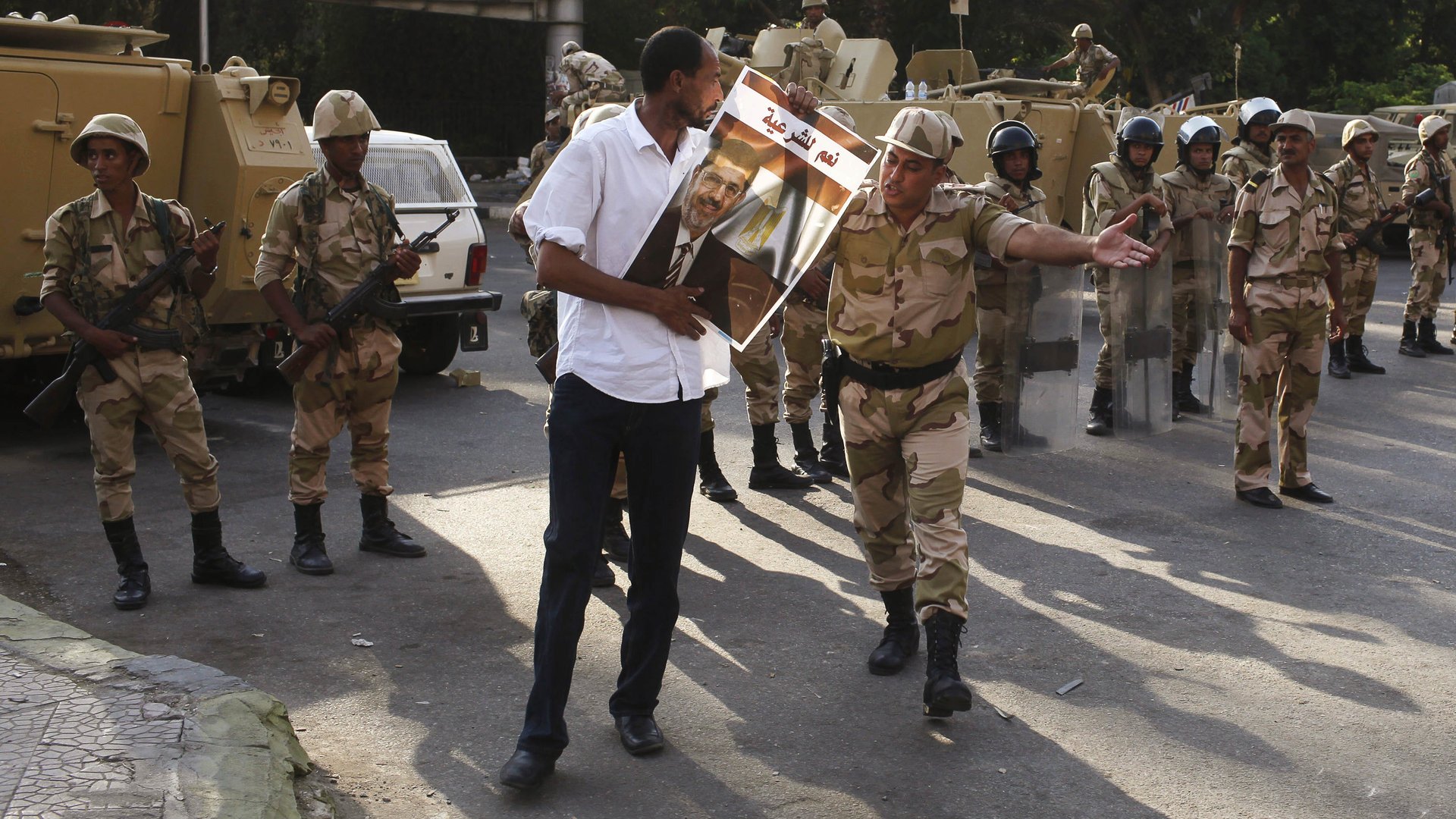Why Egypt needs elections, and not generals
Mohamed Morsi’s one-year rule of Egypt was disastrous. He ruled by fiat, alienated potential allies and failed to stabilize the country’s spiraling economy. But a military coup is not an answer to Egypt’s problems. It will exacerbate, not ease, Egypt’s vast political divide.


Mohamed Morsi’s one-year rule of Egypt was disastrous. He ruled by fiat, alienated potential allies and failed to stabilize the country’s spiraling economy. But a military coup is not an answer to Egypt’s problems. It will exacerbate, not ease, Egypt’s vast political divide.
The Egyptian military’s primary interest is maintaining its privileged role in society and vast network of businesses. Like the Pakistani military now and the Brazilian military in the past, its desire to maintain its economic interests will slow desperately needed economic and political reforms.
There is little reason to have faith in Egypt’s broken political process at this point. But the best ways to ease the country’s bitter divisions are immediate elections and a transparent political process, not military rule.
“Political inclusiveness is the only way forward,” said Lauren Bohn, an American journalist who has covered Egypt. “And many worry they won’t see much of that in the days ahead.”
First, many different–and seemingly contradictory things–are occurring in the country. The protesters that have filled Tahrir Square, David Ignatius noted Wednesday in the Washington Post, are a genuine citizens’ movement.
They are demanding basic rights, an accountable government and dignity. Most important, they will not accept autocratic rule from military dictators or Islamist political parties.
The same can be said of the protesters in Istanbul’s Taksim square. The remnants of Iran’s Green Party, who elected a relative moderate as the country’s new president, roughly fit that description as well. All these developments are positive and a sign of empowered citizens making legitimate demands of government.
But other things now occurring in Egypt are not. The country’s political elite is deeply polarized. Members of the secular opposition and its Islamists disdain one another. Any semblance of trust or compromise has disappeared.
In Tahrir Square, some protesters carried signs calling for the Obama administration to stop supporting the Muslim Brotherhood’s “fascist regime.” They scoffed at the idea that the Brotherhood would ever allow free elections and called the coup a “revolution.” They insisted that they were stopping a Brotherhood plot to turn Egypt into theocratic state that resembled Afghanistan after the Taliban.
Brotherhood supporters, meanwhile, were heartbroken, seeing the coup as a re-assertion of the military rule they have struggled to overcome in Egypt for decades. They claimed the opposition had a “personal vendetta” against the Brotherhood. And they called the current struggle “an existential battle” with the military they will not lose.
In a trenchant analysis in The New Republic, Nathan Brown, an expert on Islamist political movements, offers a detailed list of the colossal mistakes Morsi made in office. But also warns about what happens next. A crackdown on the Brotherhood, Brown suggests, could result in some of its members embracing violence.
“It would be wise for those who are now victorious in Egypt to remember that the issue is not only what the Brotherhood learns,” Brown wrote, “the issue is also what Islamists are taught.”
For the Obama administration, the coup is a minefield—and a second chance. Washington’s influence is enormously limited in Egypt. Forty-years of backing Egyptian military rulers who embraced peace with Israel have left Washington with no credibility.
As Brown notes, “Egypt’s rumor mill transformed preposterous rumor into established fact with breathtaking speed.”
Many members of the secular opposition are convinced the Obama administration placed the Brotherhood in power. Islamists, however, see an American hand behind the coup that toppled Morsi.
That is why it is vital for Washington to demand immediate elections and no crackdown on the brotherhood. President Barack Obama’s statement on Tuesday was surprisingly strong in some areas.
“I now call on the Egyptian military,” Obama said, “to move quickly and responsibly to return full authority back to a democratically elected civilian government as soon as possible through an inclusive and transparent process, and to avoid any arbitrary arrests of President Morsy and his supporters.”
He also hinted at a cut off of the $1.3 billion in aid the United States provides to Egypt, most of it military. Under American law, all US foreign assistance is cut off to a country if a military coup occurs.
Some analysts called for the United States to turn a blind eye at the coup and continue providing assistance. They argued that American strategic interests–Egypt’s peace treaty with Israel, the safety of the Suez canal and counter-terrorism efforts–justify support for military rule in Egypt.
That would be an enormous mistake. For 30 years, the United States tried that approach in Egypt. Military rule and billions in Camp David Peace Accord aid produced economic stagnation and social unrest. Egypt and region have changed. Egyptians will not accept authoritarian rule from generals or Islamists.
The most cogent reactions to the crisis from an American politician came from Senator Patrick Leahy (D-Vt.). He assailed Morsi, who he said had “squandered an historic opportunity, preferring to govern by fiat rather than work with other political parties.” But Leahy was emphatic about the need for the United States to halt aid.
“Our law is clear: US aid is cut off when a democratically elected government is deposed by military coup or decree,” Leahy said. “As the world’s oldest democracy, this is a time to reaffirm our commitment to the principle that transfers of power should be by the ballot, not by force of arms.”
Leahy is right. Immediate elections and inclusive politics are what Egypt needs. Not military rule.